
22 minute read
SOLUTIONS SHOWCASE
sOLutiOns shOwCAse Axis COMMuniCAtiOns
The Many Paths to IP Video Surveillance: It’s Never All Or Nothing
Compared to other industries that rely heavily on video surveillance, retail as a whole is the last to adopt IP-based technology. It’s no surprise, really, since retailers and their loss prevention managers have a longstanding history and major investment in analog CCTV.
Most LP professionals know about the benefits of IP video, including much better image quality, functionality, intelligence, and scalability, but haven’t made the switch from legacy analog because of cost and complexity concerns. Unfortunately, these legacy system users are missing out on major LP and operational efficiencies.
But fortunately, “going IP” is not an all-or-nothing proposition. Thanks to innovations in IP video, there are several migration paths to network video. And the good news is that even though retailers might be a little late to the IP game, those leading the way are in a unique position to benefit from network video surveillance in ways that other industries could only dream.
Video Encoders— The Easy Path to Network Video
Just like everything in our lives today, the shift from analog to digital is inevitable. Fortunately, the technology shift in video surveillance does not force LP managers to choose between either IP or analog. It’s possible to combine the two.
Video encoders, sometimes referred to as video servers, contain a compression chip and an operating system so that incoming analog video can be converted into digital video, and then transmitted and recorded over the computer network for easier accessibility and viewing. If chosen with care, a video encoder can allow a system with analog CCTV cameras to provide many of the features and functionalities otherwise reserved for IP-based systems…all without scrapping working analog cameras.
Not only do encoders provide benefits like improved video quality (contrast, color, saturation, de-interlacing, and noise filtering), video intelligence (motion and audio detection, people counting, etc.), power-over-ethernet capabilities, and local SD card storage, but they allow users to create a future-proof and scalable platform for new IP-based, HDTV-quality cameras to be added at their leisure and within budget.
Video encoders come in a variety of form factors, from single-channel to 84-channel blade chassis, and have a wide range of quality, just like surveillance cameras. Important features for LP include high-efficiency H.264 encoding, integrated audio, full frame rate video (30 frames per second), local storage, PTZ support, and intelligent video functionality.


AXIS Camera Companion— Living on the Edge for Simple IP Surveillance
While IP video surveillance is prevalent in the big-box and major retailers with 32-plus camera installations, it has historically been too costly and complex for those smaller camera count installations found in the majority of stores around the country. But for those LP professionals and retail owners who have had enough of poor-quality analog systems or are looking to install a brand new surveillance solution, the power of in-camera “edge” storage is changing the face of the industry.
AXIS Camera Companion is the market’s easiest video surveillance solution for small systems up to sixteen cameras. The system consists of standard IP cameras, SD cards, a free software client, cabling, a standard router/switch, and optional mobile applications. That’s it. No central storage is
sOLutiOns shOwCAse Axis COMMuniCAtiOns
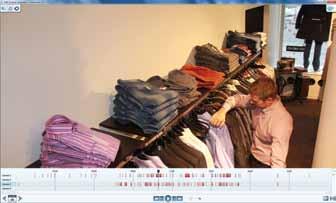
required. Not even a computer is needed following the additional set up, as the entire solution runs within the camera.
In short, the camera is the recorder. So say goodbye to the DVR.
With AXIS Camera Companion, all video is recorded on SD memory cards in the cameras. Food for thought—a 32GB SD card typically stores two to four weeks of HDTV-quality video, which is more than enough for most LP application. With no central DVR, NVR, PC, or server, each camera is a smart, independent video recording device with no single point of failure. So even if the network happens to go down, the cameras continue recording as long as they have power.
AXIS Camera Companion delivers crisp, clear HDTV image quality for reliable identification of people and incidents. It’s also easy to access the system over the Internet to view live or recorded video from home or anywhere with an Internet connection.
And Axis cameras aren’t the only way to enable AXIS Camera Companion. Video encoders that support edge storage also allow existing analog cameras to be tied into the simple AXIS Camera Companion system.
What’s better is that AXIS Camera Companion was developed with a focus on ease-of-use and ease-of-install. The interface is simple and intuitive, with easy access to the most common activities, such as viewing live video, searching through recordings, and exporting videos and snapshots at the touch of a button.
Like an encoder solution, AXIS Camera Companion is scalable and future-proof, making adding new cameras to the system a snap. Best, if you want to step up to a larger or more complex IP solution in the future, you can reuse all your installed network cameras and video encoders, as well as the network equipment.
If you’re looking for a one- to sixteen-camera count system for one or two sites, AXIS Camera Companion and innovations in edge storage create a compelling solution.
Hosted Video— Multiple Sites, One Window to Success
While AXIS Camera Companion is perfect for one or two sites, what about the retailer or franchise owner with multiple stores to secure with a few cameras at each location? For those surveillance users, new partnerships in the industry are helping to ditch the DVR by bringing the power of hosted video to LP.
In a hosted video system, retailers contract with a video surveillance service provider to install the system and then stream video data to an offsite data facility. This data facility is run by the hosting provider, who follows the same standards and auditing procedures as cloud vendors used in our everyday lives in the form of email, entertainment, HR and CRM operations, and online banking. The service provider often charges a low monthly fee to have the surveillance video streamed and stored at the hosting provider’s facility.
Hosted video accomplishes three main things for the retailer. First, by storing video in the cloud, the most expensive and maintenance-heavy part of a CCTV system—the DVR—is eliminated. Second, the cost of surveillance is switched from a capital expense to an operational one. And third, video from all the different dispersed locations is available under one platform and accessible anywhere at any time. Users can virtually travel to multiple stores all around the country while sitting in front of the same desktop, PC, or mobile device.
The security ramifications of a hosted system is a given—the stores are safer with video evidence. But just think about all the different operational efficiencies that can be attained through hosted video. The franchise owner or corporate executive who has responsibility over many stores can confirm consistent branding across stores. They can monitor and compare customer queue lines and employee response across different stores. They can engage in remote investigations instead of jetting around the country. They can even use video pulled from Albuquerque as a training tool in Albany.
And for those who need redundant storage to stream the highest quality HDTV video or would like it simply for peace of mind, Network Attached Storage (NAS) devices can be found today for as little as $200 for 2TB worth of storage. These NAS devices can also be used in an AXIS Camera Companion solution for the same reasons.
Remember, with today’s technology, you always have options. IP video is for everyone today. You just need to find the recording solution that fits your goals.

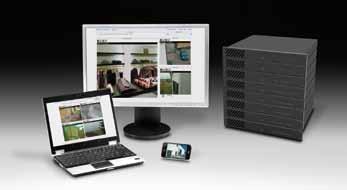
To Promise Or Not to Promise… That Is the Question
By natt O. reifler, esq. and Michelle g. hinden, esq.
Almost all states have statutes that protect retailers by providing a civil remedy that allows for the recovery of actual damages arising from incidents of theft. Actual damages are in addition to any civil statutory (penalty) damages the retailer may be entitled to and generally include restitution.
In a previous article from our firm, it was explained that even if merchandise is recovered in merchantable condition, there are actual damages. Likewise, and even less likely to be contested, when the retailer is not able to recover the merchandise or the assets taken by the theft offender, the retailer suffers actual damages. When a retailer suffers actual damages, the retailer has a right to request reimbursement for actual losses sustained in addition to any available civil statutory (penalty) damages.
A promissory note is an unconditional written promise, signed by the theft offender, to pay a sum of money to the retailer.
Generally, when a theft offender is apprehended, it is beneficial for the retailer to obtain a verbal and written admission from the theft offender. If the theft offender is an employee, it is advisable to also get a signed promissory note for any restitution amounts owed. It is also helpful to notify the theft offender of the retailer’s intention to request civil statutory (penalty) damages and/or restitution from the theft offender whether through an in-house process or through a civil recovery law firm. If a promissory note is freely and voluntarily signed by the theft offender, a request for restitution and/or, if available and mentioned as an exception to the promissory note, civil statutory (penalty) damages can then be made by the retailer.
Is a promissory note required? No, but it can be useful in strengthening the retailer’s civil restitution claim. The purpose of a promissory note is to contractually bind the theft offender to his or her promise to pay the retailer back for any actual losses the retailer sustained. If a promissory note is well drafted and the promissory note is breached, a retailer could be entitled to pursue the agreed upon amount listed in the promissory note, any statutorily prescribed interest rates, court costs, attorneys’ fees, and any other amounts allowable by law.
Criminal Prosecution
If the police are contacted and the theft offender is prosecuted, a theft offender may generally choose to remain
NATT O. REIFLER, Esq. is a partner in the Law Offices of Palmer, Reifler & Associates, P.A. His responsibilities include the overall supervision of the legal department and its team of dedicated collectors. Reifler also consults on compliance issues, serves as a legal liaison to our clients, and advises on the firm’s day-to-day activities. Reifler graduated cum laude from Stetson University College of Law and joined the firm as an associate in 1997. Within three years he became a partner and took a more active role in supervising civil recovery activities within the firm. Prior to that, Reifler worked both as a commercial realtor and was also the director of operations for the Florida operation of his family-owned retail business.
Reifler received his bachelor of arts degree from the University of Maryland Baltimore County and is licensed to practice law in the State of Florida. MICHELLE G. HINDEN, Esq. is a senior associate attorney in the Law Offices of Palmer, Reifler & Associates, P.A. where she represents clients in structuring and negotiating settlements, in mediation, and, in small-claims court. Hinden received her bachelor’s degree in psychology from the University of Central Florida, her juris doctor from Florida Coastal School of Law, and is licensed to practice law in the State of Florida.
in compliance with the terms listed in the promissory note by making payments to the retailer’s civil recovery law firm during the criminal case process. The amount of restitution paid to the retailer’s civil recovery law firm during the criminal case process should be treated as a set-off to reduce the restitution amount ordered in the criminal court matter. If the criminal court orders an amount lower than the promissory note amount, a retailer may elect to continue to pursue the remaining balance of the promissory note.
If the theft offender is not criminally prosecuted, a retailer may elect to request any restitution and/or civil statutory (penalty) damages it may be entitled to. Should the theft offender refuse to make payment after demand has been made, a retailer may elect to pursue civil litigation.
While having a promissory note may be beneficial, it is important to note that while clearly distinct from the criminal prosecution of the theft offender for the wrongful act(s), some jurisdictions have prosecution policies that seem to blur the civil/criminal distinction. For this reason, it is important for the retailer to find out the local policy in the jurisdiction where the store is located. While the majority of states and jurisdictions follow the statutes and supporting case law that specifically allow for a civil matter to be pursued regardless of whether or not there is a criminal matter, it is important to check with your local courts to ensure that the local judge and/or prosecutor agrees with this position.
If successful pursuit of criminal charges takes precedence over the enforcement of a promissory note, the retailer may elect to forego a promissory note and instead choose to obtain a written admission statement from the theft offender. If the retailer elects to forego the promissory note because of a local prosecution policy that discourages same, the retailer should determine whether a statement expressing the theft offender’s willingness to repay the admitted theft amount could hamper a prosecution. When a theft incident takes place, it is important for the retailer to have proper procedures in place that will help strengthen the retailer’s chances of recovering the damages it may have sustained.
Generally, absent any unusual prosecution policy, having the theft offender indicate a willingness to repay is helpful. The retailer should keep well-documented evidence of such losses in the event that the retailer elects to pursue a civil restitution claim for any difference in restitution that is not ordered in the criminal matter.
Proper Procedures
When a person is apprehended for shoplifting in a store, the retailer may suffer actual damages in addition to civil statutory (penalty) damages. When a theft incident takes place, it is important for the retailer to have proper procedures in place that will help strengthen the retailer’s chances of recovering the damages it may have sustained. In many instances, the signing of a promissory note by an internal theft offender can help to strengthen the retailer’s position and improve the chances of recovering money owed by the theft offender to the retailer.
Retail’s Civil Recovery Law Firm
Law Offices of Palmer, Reifler & Associates, P.A. is a leading civil recovery law firm that has been practicing in the loss prevention/asset protection industry concentrating on recovering theft losses for retailers for over twenty years. The firm represents many national and regional retailers in the various aspects of civil recovery for theft, including the recovery of damages and/or penalties and, when applicable, restitution from theft offenders, whether dishonest associates or shoplifters at the initial phase or in a follow-up capacity, the structuring of retail in-house civil recovery programs, and the defense of claims or regulatory issues against retailers.
sOLutiOns shOwCAse ALPhA
Alpha High Theft Solutions. Proud to Be an American-Made Company!
In the last six years more than six-million jobs have been outsourced overseas and away from America. Today only about eleven-million people still manufacture things in the United States—the lowest number since 1941. American products can’t always compete on low price, but we can still lead on quality, safety, service, durability, and speed to market.
Alpha has been manufacturing in the U.S. for more than thirty years. Our 210,000-square-foot Canton, Ohio, manufacturing plant is strategically located in the Midwest, which allows for optimal delivery to our customers. Last year alone, more than thirty-million units were produced and shipped to some of the top retailers in the world. The plant directly provides more than 200 jobs for engineers, quality staff, customer-service representatives, global project leaders, and more, not to mention utilizing more than fifteen local molder/contractors who provide raw materials, components, and finished goods.
There are many benefits to having full-line manufacturing in the U.S. By producing from start to finish, Alpha is able to meet our customers’ needs with end-to-end manufacturing control, ensure the quality of our products, ship products with 99.9 percent accuracy, and manage inventory. Other benefits include quicker time to market updates, fewer delays due to time zones, and more eco-friendly production.
In February of this year, the Canton facility was rated fourth out of 2,405 companies by FM Global in their annual Risk Report, putting us at the top of the loss prevention industry for safety, quality systems in place, storage, evacuation plans, and more. We were also ranked 46 out of the top 100 of all mid-sized U.S. manufacturing plants in “Quality Leadership” by Quality magazine, a ranking based on criteria such as contribution of quality to profitability, shareholder value, and the number of quality programs. Canton is proud to boast that their plant has had “zero lost-time accidents” in the past six years. Additionally, Canton ranks number one among all other Checkpoint sites. “Our Canton team is extremely passionate about the quality of products we produce, and proud of the safety ratings we have consistently achieved,” says Gale Essick, director of manufacturing in Canton. The local community also benefits from the generous Canton team. Many are actively involved in regional activities, such as volunteering with the Akron/Canton Regional Food Bank, collecting for “Coats For Kids,” and participating in the “Pathways Giving Tree.” We’ve all experienced the effects of our country’s economic downturn, including high unemployment rates and people questioning the security of their future. Our commitment to continuing to produce a multitude of American-made solutions for our industry stems from our desire to have a positive impact on our economy in terms of growth, innovation, and domestic job creation. “We will continue increasing our U.S. manufacturing in the future,” states Larry Yeager, High Theft Solutions vice president and general manager of Alpha. “Why? Alpha recognizes the opportunity and Because competitors may approximate our products responsibility we have in revitalizing or attempt to replicate our services in low-cost the American manufacturing countries, but they cannot industry. We are proud to be the replicate our people. Our workforce is an important only company in our space that manufactures in America. component of the truly sustainable, competitive advantages we have.”
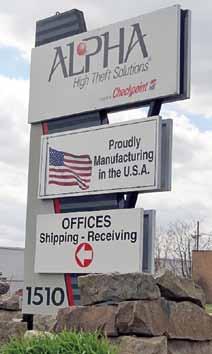
sOLutiOns shOwCAse instAKey seCurity systeMs
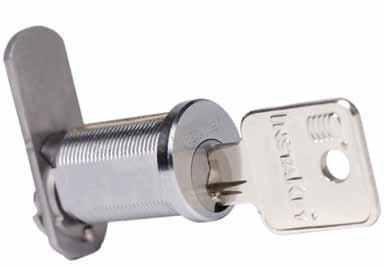
Improving Fuel Dispenser Credit-Card Information Security
Due to emerging concerns surrounding credit-card data theft and tampering, Susser Holdings Corporation needed a new security solution. On one level they needed to upgrade or replace their fuel dispensers to meet current regulations, but they also needed an improved physical security lock that controlled personnel access.
In March 2011 at the SPECS (store planning, equipment, construction, and facilities services) convention in Grapevine, Texas, Craig Scotton, Susser Holdings senior director of petroleum services, found InstaKey Security Systems’ KeyControl™ program to utilize for their Stripes® convenience store locations.
At Susser Holdings’ request, Petroleum Solutions, a Houston-based fuel management distributor, was already researching new lock technology for these fuel dispenser upgrades. Upon review of InstaKey’s KeyControl program, “We felt this was the most cost-effective and secure solution available,” said Mike Vegeais, director of business development.
With InstaKey’s KeyControl program, the key blanks themselves are only available through highly controlled licensed distribution channels and not available on the open market. Each key blank is individually serial numbered and tracked from the first day of production, through all key issuances, and until the day it is deactivated by the enduser. InstaKey’s patented SecurityRecords.com™ Internet-accessible software tracks the key-holder assignment history for real-time accessibility. The database also provides rekeying exception and key compliance reporting that can be managed by the customer’s operations, facilities, and security departments, or any InstaKey representative.
Petroleum Solutions and InstaKey Security Systems personnel worked in conjunction to develop, coordinate, and install the new rekeyable cabinet lock technology during each dispenser’s encrypted PIN pad upgrade. Also, in order to provide a simple single-key solution, Susser Holdings elected to have a corporate grand master key for all locations, vendors to
receive master keys for specific geographic areas, and key alike all fuel dispensers by location.
In lost, stolen, or unaccounted for key situations, InstaKey’s lock hardware technology enables immediate rekeying of locks up to twelve times on-site by store personnel. This technology also allows independent rekeying between the store, area master, and corporate grand master key levels. “The customer now can rekey only at the level of the misplaced key without replacing all keys,” says Vegeais.
By InstaKey offering a revolutionary rekeying technology, fuel supervisors now have a cost-effective solution that can resolve company-wide rekeying costs when a key is compromised. By tracking all of the key-holder information, Stripes locations can also quickly audit and/or rekey in a fraction of the time it used to take to change out all the locks.
“We were very pleased to see these two vendors work in conjunction for us on this project,” said Craig Scotton, senior director of petroleum services, Susser Holdings.

SUSSER HOLDINGS—Corpus Christi, Texas-based Susser Holdings Corporation is a third-generation, family-led business with approximately 1,100 company-operated or contracted locations. The company operates over 540 convenience stores in Texas, New Mexico, and Oklahoma under the Stripes banner. Restaurant service is available in more than 325 of its stores, primarily under the proprietary Laredo Taco Company brand. The company also supplies branded motor fuel to over 560 independent dealers through its wholesale fuel division.
sOLutiOns shOwCAse wg seCurity PrODuCts
Sentinel—The Future of EAS Today
By John werner, Director of technical services
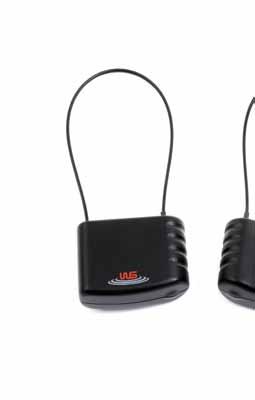
While there remains a need for EAS in the retail world, it is a sad fact that many EAS technologies in the market today remain stagnant and sadly out-of-date to cope with the menace of shoplifting in the new millennium. The fact is that shoplifters are becoming more organized and more technologically savvy in their approaches to theft, leaving most retailers scratching their heads when faced with increasing shrinkage numbers. Most EAS has evolved at a snail’s pace in comparison.
In my twenty-five years in the EAS world, I have witnessed first-hand the apathy of many in the industry in terms of technological improvement to EAS products. As long as companies keep making money selling equipment that is easily defeated, there really is no motivation to improve performance. Because of this, many stores use equipment that is so outdated they may as well not have any security of any kind.
After spending fifteen years at industry giant Sensormatic, I became director of technical services at WG Security Products in San Jose, California. When I made the move, I witnessed a company that made technological innovation a priority, and I couldn’t be more excited to be a part of it. WG transformed EAS tagging with their 58KHz ferrite technology, which has since become an industry standard. We developed the world’s first 4-alarm smart hard tags. Our pedestals feature not only robust performance, but aesthetics that can’t be matched. And now comes a pinnacle in theft prevention—Sentinel.
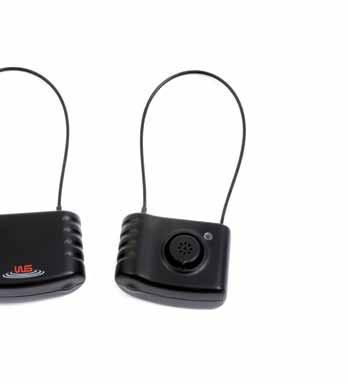
Revolutionary Technology
Sentinel is a revolutionary technology that represents the next step in EAS technology. This unique technology is designed to contain merchandise within a designated area, without the use of cables or lock-up. Sentinel is comprised of a series of readers, called RADs (Radiate and Detect) installed on walls near the ceiling throughout the store, thus eliminating the eyesore of pedestals for your customers. These readers communicate with specially designed tags via radio frequencies to ensure that tagged items stay within the designated area. If a tag leaves the range of the RADs, the system will alarm at the point of exit of the store. If a Sentinel tag is tampered with in any way, this disrupts the radio signal and causes the Sentinel tag itself to alarm. A Sentinel tag cannot be removed without the signal being deactivated first and that can only be achieved with a specific Sentinel detacher (called a Sales RAD) located at the point of sale. If a tag is removed without proper signal deactivation, the tag will alarm. Sentinel can also be catered to work with wireless headsets, so alarms can be silent in the store, but fed into the ears of your employees directly.
The beauty of Sentinel is its simplicity. Since there are no pedestals to worry about, no floor cutting or drilling is required. It takes very little time to set up, which makes its installation a breeze for both us and for our customers. Sentinel is extremely efficient at power consumption compared to legacy EAS systems. There are also minimum service requirements with Sentinel—no false alarms or phasing issues that are common with legacy pedestals. Once installed, the system is programmable from the floor. No climbing ladders and no annoyance to shopping customers if service is needed. The design of Sentinel readers is sleek and compact and with its location being above the merchandise, it can be considered an invisible system.
Retail and Beyond
While the retail applications are obvious to any retailer with an eye for high-end security and invisibility, Sentinel is also a terrific monitoring system. Hospitals, warehouses, correctional and government facilities, or any environment where items, or even people, need to be tracked and secured, Sentinel is an answer. Sentinel software is customizable for every tracking need. Sentinel has been installed at several airports in Europe to amazing results, and it is primed to make a splash here in the U.S. Along with Sentinel, WG is perfecting RFID plus EAS technology. We have introduced the Protection with Class collection, a series of elegantly designed tags that combine aesthetics with performance. Our service department will release later this year mobile applications for remote tuning of pedestals.
When it comes to technological innovation, no company can match WG Security Products. Many companies look forward to the future. The future of EAS is already here in the present at WG—The Innovators in EAS-RFID-CCTV.
For more information about Sentinel and other state-of-the-art products, contact WG at info@wgspi.com or visit www.wgspi.com. Follow WG on Twitter: @wgspi.







